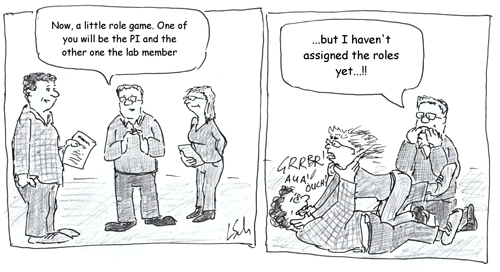 I got a good chuckle from the cartoon drawn by Leonid Schneider, participant at a recent EMBO Lab Management course run by Leadership Sculptor near Heidelberg, Germany. While the cartoon emphasises the strong involvement of participants, I have to add a disclaimer that no participant has been injured during a lab management course!
I got a good chuckle from the cartoon drawn by Leonid Schneider, participant at a recent EMBO Lab Management course run by Leadership Sculptor near Heidelberg, Germany. While the cartoon emphasises the strong involvement of participants, I have to add a disclaimer that no participant has been injured during a lab management course!
When I caught up with Leonid on the phone this week, he was waiting for the final corrections from some fellow authors so that he could send off the revised manuscript before Christmas. I think he was hoping I’d be a person with corrections, rather than a person with questions.
I had overheard during one of the breaks that he is a gifted cartoonist, whose work has appeared in the Lab Times journal since 2007. After the course, I invited him to draw a cartoon about his experience for which I promised him artistic freedom, so long as the cartoon didn’t libel a participant. (Full disclosure: I have remunerated Leonid for this artistic work).
He started drawing cartoons while at school, where some of the characters were his teachers whom he wove into SciFi stories. I asked Leonid how his cartoons influence his research creativity. He replied that they often serve as a valve to let off frustration when things aren’t running smoothly (the general public doesn’t usually see these ). This dose of humour helps to keep him going. Indeed, one cartoon sneaked its way into his Ph.D. thesis!
We also talked briefly about his take-aways from the lab management course.
“You can’t expect to change everything in three days. However, the course helped me to identify what I need to work on, and it gave me tools and ideas about how to work on them. In particular, I learned a lot about communication. This Parent-Adult-Child model [Transactional Analysis] helped me to understand a lot of conversations. As a graduate student, I used the Child part of the model a lot, which pushed some people to respond in Parent mode; today, I realise that such a Parent-Child pattern coming from a leader could destroy productivity in a lab.”
“In addition, the personality model in the course [the Enneagram] allows me to better understand myself and other people with whom I am working. It also helps me to identify and tap into natural strengths – and also to know, what’s not me. I won’t be a Max Planck Director and I can still be a good scientist.” Especially if his co-authors supply the corrections in time.
I hope he didn’t have to wait much longer for that call.
